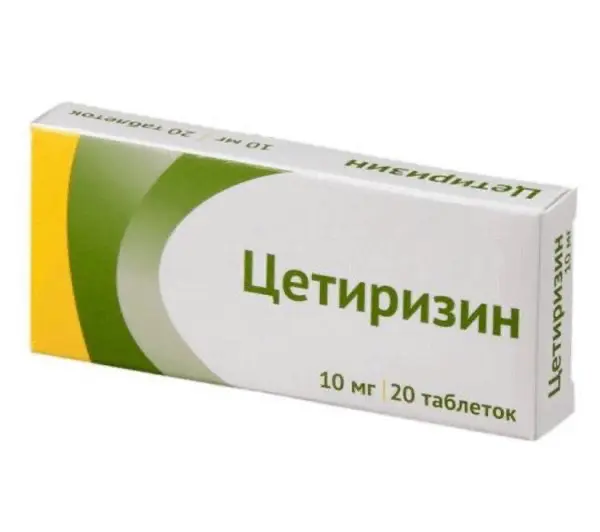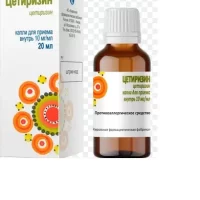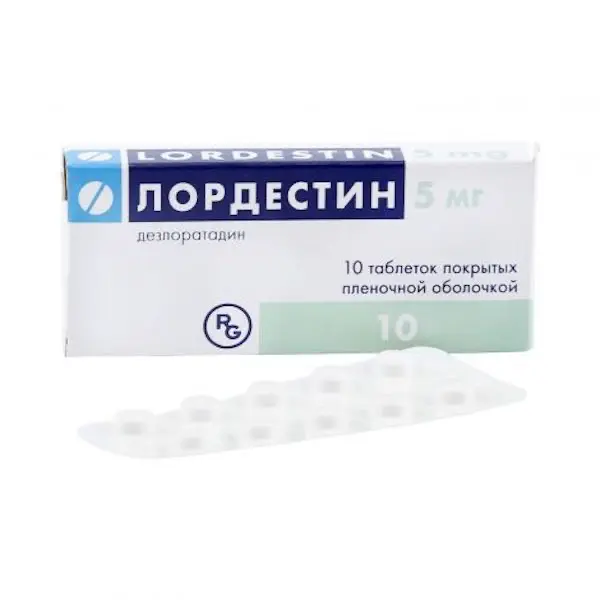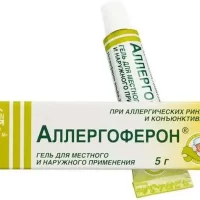Description
Cetirizine Pharmacodynamics
Cetirizine belongs to the group of competitive histamine antagonists, blocks H1-histamine receptors, has practically no anticholinergic and antiserotonin action. It has a pronounced anti-allergic effect, prevents the development and facilitates the course of allergic reactions. It has antipruritic and antiexudative effect. It affects the “early” stage of allergic reactions, and also reduces the migration of inflammatory cells; it inhibits the release of mediators involved in the “late” stage of an allergic reaction. Reduces capillary permeability, prevents the development of tissue edema, relieves smooth muscle spasm. It eliminates the skin reaction to the introduction of histamine, specific allergens, as well as to cooling (with cold urticaria).
In therapeutic doses there is practically no sedative effect. Tolerance does not develop during a course of treatment.
The action of the drug after a single dose of 10 mg of cetirizine begins after 20 minutes (in 50% of patients), after 1 hour (in 95% of patients), and lasts for 24 hours. After discontinuation of the drug, the effect lasts up to 3 days.
Indications
Cetirizine dihydrochloride, 10 mg film-coated tablets is indicated for use in adults and children from 6 years of age and older for relief:
– nasal and ocular symptoms of year-round (persistent) and seasonal (intermittent) allergic rhinitis and allergic conjunctivitis: itching, sneezing, nasal congestion, rhinorrhea, lacrimation, conjunctival hyperemia; symptoms of chronic idiopathic urticaria.
Contraindications
– Hypersensitivity to cetirizine, hydroxyzine or piperazine derivatives and to other components of the drug;
– Terminal stage of renal failure (creatinine clearance < 10 ml/min);
– Lactose intolerance, lactase deficiency or glucose-galactase malabsorption;
– Pregnancy, breastfeeding;
– Children under 6 years of age (for this dosage form).
Caution:
– Chronic renal insufficiency (dosage regimen adjustment required);
– Chronic liver disease;
– Elderly age (decrease of glomerular filtration is possible).
Administration during pregnancy and breast-feeding:
The use of the drug during pregnancy is contraindicated. If it is necessary to apply the drug during breast-feeding, it is necessary to decide on stopping breast-feeding.
Dosage and administration methods
- Inside. It is recommended to wash down the tablets with a glass of water.
- Adults
- 10 mg (1 tablet) once a day.
- Specific patient groups
- Elderly patients
- There is no need to reduce the dosage in elderly patients if renal function is not impaired.
- Patients with renal impairment
- As cetirizine is mainly excreted by the kidneys (see subsection “Pharmacokinetics”), in patients with renal insufficiency the drug dosage regimen should be adjusted according to renal function (creatinine clearance (CK) values) if it is not possible to provide alternative treatment.
- Creatinine clearance for men can be calculated based on serum creatinine concentration, using the following formula:
- CK (ml/min) = [140-age (years)] * body weight (kg) / 72 * serum creatinine CK (mg/dL)
- Creatinine clearance for women can be calculated by multiplying the value obtained by a factor of 0.85.
- Dosing in adult patients with renal failure
- Renal failure CK (ml/min) Dosing regimen
- Norm ?80 10 mg/day
- Mild 50-79 10 mg/day
- Moderate 30-49 5 mg/day
- Severe 10-29 5 mg/day
- End stage dialysis patients <10 CONTRAINDICATIONS CONTRAINDICATIONS CONTRAINDICATIONS contraindicated
- Patients with hepatic impairment
- No dosing adjustment is necessary for patients with hepatic dysfunction only.
- In patients with hepatic and renal dysfunction, dosing adjustment is recommended (see table above).
- Children
- Children from 6 to 12 years of age
- 5 mg (1/2 tablet) twice a day.
- Children over 12 years of age
- 10 mg (1 tablet) once daily.
- Sometimes an initial dose of 5 mg (1/2 tablet) may be sufficient if satisfactory symptom control is achieved.
- In children with renal insufficiency, the dose is adjusted according to CK and body weight.





